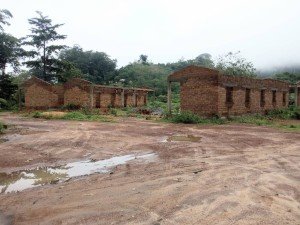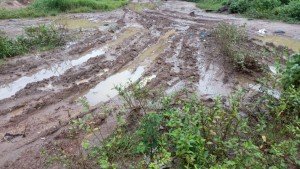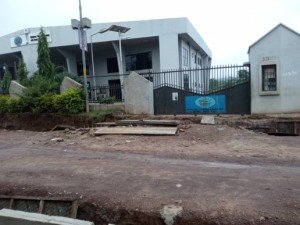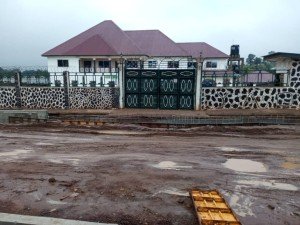By Othman Sheriff
There are many hot spots of social and political marginalization in post-conflict Sierra Leone, but over the years, the most notorious one has been Kenema city, as successive governments constantly deprived them of desperately needed infrastructural developments that they even deserved more than many other communities.
When taken into consideration, the strategic nature of the city, geopolitically and socioeconomically, Kenema is a hub of both macro and microeconomic activities, as the city serves as the administrative headquarter of the eastern region, which includes the diamondiferous district of Kono and the fertile cacao-farmland of Kailahun, which places the country’s flag among diamond and cacao exporting countries in the world.
The marginalization began with late President Kabbah’s led SLPP, which took Kenema district for granted, as a diehard stronghold, where he could take a free ride at any time during electioneering process. Of course, few chiefdoms across the district benefited from the then post-war reconstruction, rehabilitation, and resettlement projects, which constructed some primary schools and Peripheral Health Units (PHUs) without beds, mattresses, and adequate medical supplies. APC’s emergence as winner of the 2007 run-off even added salt to the wound, as former President Koroma’s administration completely swept the district under the carpet in terms of development.
If I’m to count few legacies of APC in Kenema, I would start from the plaza project, which cannot be entirely disassociated from SLPP; street solar lights, which was distributed according to the number of red votes in a particular area (Please check at the late Resident Minister, Juana Smith’s compound, if you don’t believe me); and the bumpy Blama-Hangha road spoiled (sorry), constructed by First Stricon. The rest remained unfulfilled promises.
With the emergence of President Bio’s SLPP administration, the table seemed to be gradually turning around, as the central government has embarked on few development projects in the region, which encompasses Kenema city. Road infrastructural development, which had been neglected for decades, seemed to be top on the list. And to say the least, every genuine citizen of Kenema now embrace the ongoing road construction projects.
Meanwhile, in as much as everybody is happy and clapping about the project, the contractors need to implement it humanely to maintain the positive impact associated with it. Yes, some things are not right about it, and authorities need to correct them as quickly as possible for the greater good of Kenema.
A few days ago, I had a gentlemanly conversation on two occasions with Mr. Achmed Rogers, Administrative Manager of Pavi Fort Al Associates (SL) Ltd, the main contractor for the ongoing road construction exercise in the city. I called Mr. Rogers when his engineers attempted to cut entrances to the headquarters of Youths in Action for Development (YAD) and the Regional Office of NASSIT, all of which are situated at Maxwell Khobe Street in Kenema. I called Mr. Rogers, not to stop the ongoing infrastructural development project, but to request his audience to discuss how he could do his job without hampering the functionality of important institutions that are located along Maxwell Khobe Street.
YAD, for example, is currently accommodating more than 100 commuters per day, including staff and students of Youth Resource Academy, a newly established technical and vocation institute that is offering free education to underprivileged youths in the city. Furthermore, the organization is currently implementing multibillion Leones community development projects that are strictly time-bounding. NASSIT, as every reader may know, is receiving hundreds of pensioners per day, mainly older people. The purpose of calling Mr. Rogers’ attention therefore, was to suggest an alternative path in the form of a metal or wooden bridge, which YAD and NASSIT could use while the construction progresses.
A similar problem is affecting many older people, especially women, who do not have the energy to climb and jump over the newly constructed gutters. They are falling from the thin wooden paths provided by Pavi Fort around Fishery. Some areas do not even have one. Unfortunately, most of them are forced to go to Fishery every day, in order to place dinner on the table.
During my short discussions with him, Rogers asked me to suggest a solution to the prevailing situation, even though I was expecting him, being the construction engineer, to have a better alternative before cutting off YAD and NASSIT offices from the general public. Unfortunately, Mr. Rogers didn’t show up until both offices have been cut off completely, and their operations have been halted without any contingency plan. I don’t think this is what we have been yarning for. Though I’m a qualified journalist, I’m writing here as a youth activist, development professional, and conflict scholar, who has the interest of the poor in the topmost column of all that I do. My opinions about community development are totally humanitarian and unpolitical.
This piece is therefore dedicated to Mr. Rogers and the leadership of Pavi Fort so that together we can find a solution to the prevailing stalemate at Maxwell Khobe Street. It will entail a brief introduction of Pavi Fort (for those who do not know), how the average Kenema citizen view Pavi Fort (including myself), how is Pavi Fort doing in Kenema generally, human interaction with key personalities, Public Relations/Information sharing, and suggestions/solution.
- Who is Pavi-Fort
PAVI FORT – AL ASSOCIATES (SL) LTD is a Civil Engineering & Construction firm formally incorporated in Sierra Leone in the year 2015. The company has a direct tie with its Spanish counterpart, PAVI-FORT (SPAIN). Its main areas of expertise are Road, Building, Bridge and Dam construction. Pavi Fort may have constructed roads in other parts of the country, but since the erstwhile administration intentionally side-lined Kenema, this is its first contract in this part of the country. Pavi Fort is well equipped to execute construction contracts in Kenema and beyond. The company is headed by the Chief Executive Officer, Alhaji Alimu Sanu Barrie.
- How Does the Average Kenema Citizen View Pavi Fort
When Pavi Fort stormed Kenema on 19th December last year, residents of the city welcomed them with a rousing jubilation, as they viewed their arrival as the sign of light at the end of the dark tunnel, after decades of infrastructural marginalization. At the jubilant ceremony, the Chief Executive Officer, Alhaji Alimu Sanu Barrie was crowned honorary chief of Kenema and was dressed in a traditional regalia that portrayed a senior citizenship status in the city. Perhaps the blue lagoon welcoming ceremony wasn’t only because Pavi Fort’s arrival was timely, but the city also recognized them as messengers of hope sent by the SLPP government, which has a very deep root in the city. Some of us applauded the motion because, unlike other road construction companies, Pavi Fort carries the suffix (SL), which signifies absolute Sierra Leonean ownership, though with some Spanish DNA.
As one of the development professionals and senior citizens of the region who have been, and still are, complementing efforts of the central government in our own little ways through socioeconomic development projects, I would like to, on behalf of other development volunteers and senior citizens of the region, seize this moment to thank President Bio and every member of his administration, who in one way or the other, may have contributed to the ongoing road infrastructural development projects in Kenema city.
- Is Pavi Fort Doing it Better
From my own point of view, I could judge from Maada Bio Street to Reservation road that Pavi Fort is using rich materials; ranging from concrete, iron rod to granites. The gutters are also deep enough to accommodate the expected gravity of water and waste during the rains. Even though those areas have not yet been tared, but I could still drive along the unfinished roads without any concern of safety for my jeep or much thought about future sustainability. The roads are flat and smooth without any bumpy traps like other roads such as Blama, Dama and Hangha roads.
- What about Human Relation with Kenema Citizens?
When talking about human relationships in development term, we don’t necessarily refer to the one that prevails between a contractor like Pavi Fort and politicians or local authorities. Rather, we refer to the interaction with ordinary voters, who have less to do with decision-making.
We do understand the fact that Pavi Fort has been sub-contracting its works to local contractors, over whom the main administration might have no direct control. However, whatever such contractors might do or say would be blamed on Pavi Fort, who contracted them. This is why capacity building and vivid sensitization should be part of the contract. I must therefore state here categorically that most Pavi Fort workers I have interfaced with, lack etiquette and moral manners of approach. They speak to everyone almost in the same tone: “wuna for appreciate we because we cam make wuna roads. Bra, watin de happen? You borbor dem dae ya oo…” Whenever I ignored them, they would say: “Kenema people nor get adjo; den nor de even ge we cold water”.
Pavi Fort needs to make it known to its staff or sub-contractors that the ongoing road construction project is not a boyfriend/girlfriend gift to the Kenema people; they deserve it! We do also know that the objective of every investment is to maximize profit. Pavi Fort must have included its marginal profit in the bid documents submitted to the central government for this project. The relationship between Pavi Fort and Kenema residents, therefore, is not a beneficiary/benefactor one. While we do appreciate the development, we also retain our right and respects as citizens of the city. We give our money, food and water to those who respect us.
- Pavi Fort’s Public Relations (PR) and Information Sharing
In developed countries, all residents and property owners with property abutting a road project will receive an informational letter from the contractors several weeks before construction begins. If pavement has to be replaced that will affect a resident’s driveway access (such as YAD and NISSIT’s), they will be notified 72 hours in advance and an alternative exit would be arranged first. If a resident’s water has to be shut-off for any duration, they will be notified 24 hours in advance via a door hanger. Weekly project updates are posted on the project page as well as sent out in a weekly blast, radio and TV.
In addition, clearly readable and visible road signs are always displayed days ahead to show detours and alternative routes to pedestrians, bike riders and motor drivers. We know that Sierra Leone is a developing country, but we can also try our best to imitate good practices of developed countries.
Unfortunately, just like all other road contractors in the region, Pavi Fort does not prioritize information sharing with ordinary citizens. PR in community development does not only refer to claiming self-aggrandizement in radio, newspaper and social media. PR means taking the right information to the right people at the right time so as to gain confidence, respect and appreciation of the intended people. Pavi Fort contractors are misguidedly cutting culverts, underground pipes, entrance ways into compounds and important offices, block overcrowded markets such as Fishery etc. without informing any of those it affects. While we really appreciate the road infrastructural development, we think it is insensitive and barbaric for Pavi Fort to cut water pipelines into a residential area and entrance path into an office without informing those it will affect. Alternative remedies should be discussed first before going into action.
Now that Pavi Fort has become a major role player in the development of Kenema city, we expect its management to establish a complaint/information desk, where vital issues affecting the ordinary people can be discussed. This could be a toll-free telephone line or a real information desk with someone manning it 24/7.
- Conclusions/Suggestions: What about a Corporate Social Responsibility (CSR)?
In this paragraph, I will discuss the importance of Maxwell Khobe Street in Kenema and how a responsible business outfit like Pavi Fort could help the central government and people of Kenema in the form of Corporate Social Responsibility (CSR) at this very crucial moment in the city’s history. CSR does not only refer to charitable ventures that go directly to poor people in slums. It also means direct assistance from business conglomerates to communal institutions, especially in areas that the central government cannot duly afford. Helping the government simply means helping the people. By practicing corporate social responsibility, also called corporate citizenship, a company can be conscious of its impact on all aspects of society, including economic, social, and environmental. Being a relatively new company, we don’t expect Pavi Fort to allot billions of its resources to charitable ventures, but it can simply extend common gestures to citizens of Kenema at this very crucial time.
The leadership of Pavi Fort may know that Sierra Leone is counted among the poorest in the world, with majority of its citizens living below the global poverty line. Ranked 182 out of 189 countries in UNDP’s world development index, Sierra Leone is constantly donor-driven at all levels. This tells us that a responsible investor should not shy away from helping the government in any form or shape. This does not affect in any way their existing contract with the government.
Does the leadership of Pavi Fort know that Maxwell Khobe Street is the most crucial street in the entire eastern region? Does Pavi Fort know that cutting Maxwell Khobe Street could directly affect the whole of the provincial administration of the eastern region? A good CSR contribution at the moment should be the creation of an alternative route that can make all government offices that depend on Maxwell Khobe Street reachable. This includes the offices of the Resident Minister, Provincial Secretary, Senior District Officer, Judge, Magistrate, High Court, Correctional Centre, NASSIT, Anticorruption Commission, Ministry of Agriculture, Ministry of Mineral Resources, Regional Environmental Health and Sanitation, SALWACO, and Civil Registration Authority.
Youth in Action for Development (YAD), the leader of all local NGOs in Kenema district and the only youth-serving agency that offers free Technical and Vocational Training for underprivileged youth in the city is also situated at Maxwell Khobe Street.
What form of CSR can be more appreciable and laudable to the people of Kenema than paving the Dorwaila/Show field route at the back of ACC office, so that all those important offices can have a free access to the city? The distance is just about a kilometer. Incidentally or ironically, this road is also helpful for Pavi Fort itself, since all its construction gadgets/materials are stationed at the show field, and its leadership is currently constructing a temporal home on the same route.
With the above piece, I hope I could provide some meaningful insights and ideas to the Pavi Fort’s Administrative Manager, Achmed Rogers, who asked me on the phone to do so.
About the author, Othman Sheriff
Born and raised in Kenema district, eastern Sierra Leone, Othman Sheriff is a youth activist, development professional and peacemaker. He is deeply involved in community development projects. Over the years, Sheriff has formulated and implemented billions of Leones worth of development projects with funds from Europe and USA. He is chiefly focused on community infrastructural development and economic resuscitation projects, fostering interethnic, interreligious and sociocultural cohesion among the young population in Kenema district. Sheriff is the Project Coordinator and co-founder of Fambul Tik which is based in Berlin, Germany. Fambul Tik is the main donor and mentor of Youth in Action for Development (YAD) which is very active in the eastern district of Kenema.
Sheriff is a member of many diplomatic and international peacebuilding initiatives including the United Religious Initiative (URI), International Association of Educators for World Peace (IAEWP), Intercultural Leaders Network and Youth Solidary Fund program of the United Nations Alliance of Civilization (UNAOC). Sheriff holds a Bachelor’s degree in Mass-Media and Communication and Master in Conflict Mediation, Mitigation and Human Security.
You can contact him at othmaqs@yahoo.co.uk











